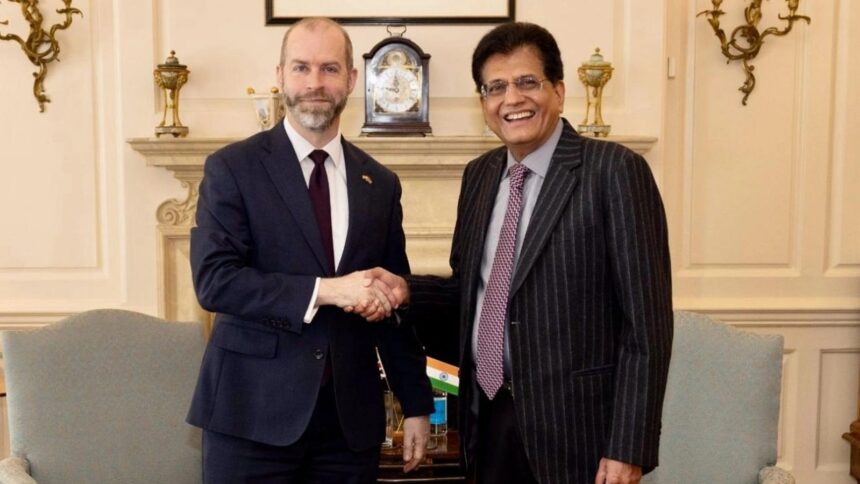As radical changes in US trade policy speed up bilateral trade deal-making globally, Commerce Minister Piyush Goyal met his counterpart, UK Secretary of State for Business and Trade Jonathan Reynolds, in London, for the conclusion of a long-pending trade agreement.
“Arrived in London for two days of engaging discussions aimed at strengthening bilateral trade and investment relations.In my first engagement, held a productive meeting with the UK Secretary of State for Business and Trade Jonathan Reynolds to advance Free Trade Agreement negotiations, reinforcing our commitment to deepening India-UK economic ties,” Goyal said in social media post.
had earlier this month reported that no new round of talks was being planned, as negotiations had entered their final stages, with only a few thorny issues pending between the two countries. Agreement on rules of origin and short-term service visas were among the remaining issues.
Goyal’s visit comes within a month of Finance Minister ’s visit to the UK amid parallel discussions for a Bilateral Investment Treaty (BIT) alongside the Free Trade Agreement (FTA) negotiations.
Meanwhile, Politico reported that India has accepted that Britain will only offer “minor changes to its visa regime” as negotiations for a trade deal enter their final stages. The new rules will lead to “around 100 new visas” for Indian workers each year, a UK official told Politico.
The UK’s visa concession is a long way from New ’s opening gambit, the official said, with India originally proposing larger quotas for professionals, particularly in sectors like IT and healthcare. This could be bad news for Indian negotiators, as the services sector was a key area where India could have benefited through greater access to service sector visas.
A Global Trade Research Initiative (GTRI) report stated that the India-UK FTA is expected to yield only limited trade benefits for India, as many of its exports to the UK already enjoy low or zero tariffs. On the contrary, the UK’s exports face considerable tariffs in India, particularly on items like cars, Scotch whisky, and wines. The tariff on cars is 100 per cent, and on Scotch whisky and wines, it is 150 per cent. The FTA could lead to tariff reductions on these goods, potentially offering the UK deeper access to Indian markets.
While the UK has asked India to reduce duties on cars and whisky among other items, India has sought better access for its service sector workforce in the UK. The deal could see India lower duties to a greater extent, as it is a high-tariff country. The average tariff on goods imported from India into the UK is 4.2 per cent, but the average tariff in India on goods imported from the UK is 14.6 per cent.
Negotiations on cars and whisky have been hectic, as Indian industry has been seeking greater access to the UK market too. Indian whisky manufacturers have said that the UK should ease its three-year maturation rule, which acts as a barrier for Indian whisky brands seeking entry into the UK. The UK is seeking duty concessions in the auto sector, particularly in the EV segment.
India’s labour-intensive sectors are expected to see major gains from the India-UK FTA, especially the textile sector. Indian textile exports face tariffs as high as 10 per cent in the UK, and a trade deal could put India on par with competitors such as Bangladesh, helping to revive textile exports. Meanwhile, greater integration in the services sector with the UK could help create more jobs in the fast-growing industry.
Notably, the UK’s carbon tax has been a concern for India, as it could restrict Indian exports of metal products. The UK is currently in talks with the EU to align its Carbon Border Adjustment Mechanism (CBAM), expected in 2027, with a similar tax in Brussels on high-carbon emission imports such as steel, aluminium and cement. Progress to align the systems in London and Brussels is expected at a key UK-EU summit on May 19.








